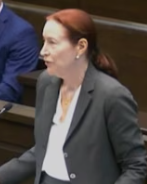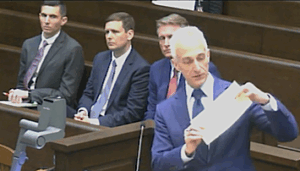In one of the grimmest, longest-running and most-litigated episodes of alleged child sexual abuse at a private school, the key question in a case now before the Georgia Court of Appeals is whether insurers’ recent policies barred coverage for incidents that happened as much as 50 years ago.
At oral arguments last week, appellate court Judge Sarah Doyle zeroed in on it:
“I can’t believe, in a million years, that these insurance companies thought in 2020 that they were insuring something from 1970 or whatever,” the judge said. “The question is: Did they inadvertently do so because the language of their policy wasn’t clear enough to make it say that.”
The high-profile litigation stems from a settlement and consent judgment between 20 former students and the 120-year-old Darlington School in Rome, Georgia, reached in 2024. A Floyd County Superior Court Judge ordered the boarding school’s five insurance carriers to pay the settlement amount, with Philadelphia Indemnity Insurance Co. responsible for $232 million of that.
Philadelphia, Zurich American, Continental Casualty, and North River Insurance appealed the decision, arguing that commercial liability and molestation policies written in the 2000s cannot be expected to indemnify or defend the school against decades-old abuse charges, even if victims came didn’t file suit until 2017.
The current appeal was deemed so important to the insurance industry that the American Property Casualty Insurance Association filed an amicus curiae brief in support of Philadelphia’s position.
“Failing to enforce the policies’ fundamental temporal requirement — bodily injury during the policy period — and thus expanding these general liability policies to cover claims when no physical injury occurred in the policy term, would significantly impact not just the parties to this case, but also the insurance system as a whole,” attorneys Parker Lavin and Laura Foggan wrote in the amicus brief. “Enforcing an insurance contract’s limitation of coverage to a discrete and finite policy period is critical to the insurance bargain.”
Regardless of the appeals court’s decision, a big takeaway for insurers may be the importance of clarifying policy language to avoid even the hint of ambiguity. Despite multiple court rulings through the years across the country, policy wording has remained a thorn in insurers’ sides.
Ambiguity and its consequences, in fact, have been the driving forces behind policy changes for generations, said Charles Nyce, professor of risk management and insurance at Florida State University.
“As terms change and understanding changes, policy language needs to keep up, and it doesn’t always do so,” he said.

A search of Google Scholar shows that the ambiguity issue may be on the rise. The number of federal appellate court decisions citing ambiguous insurance policies has tripled in the last 30 years. The overall number of federal insurance-related lawsuits has dropped only slightly in the last few years, while injury lawsuits and business liability litigation has increased in recent years, LexisNexis’ Lex Machina reported this month.
Coverage disputes are expensive for both sides, leading to litigation battles and costs that are passed on to policyholders, Daniel Schwarcz wrote in the Brigham Young University Law Review in a 2021 study. But despite that, some insurers are slow to change policy language, even after being penalized by court rulings. They sometimes appear to be content with established wording and forms, approved by the Insurance Services Office, rather than risk new drafts that could introduce new questions, Schwarcz wrote.

And it’s not just insurance contracts, but contracts of all types that are now vulnerable to poor or misplaced wording in an age of easy cut-and-paste and artificial intelligence drafting of documents, other reports have suggested.
In briefs to the court and in oral arguments, the insurers for Darlington School argued that their policy exclusions were clear enough. Most of the policies covered only claims of bodily injury, injuries that incurred during the policy period, as well as accompanying mental anguish. The trial court judge erred in finding that the injuries have continued and that they were aggravated by the school’s recent acknowledgement of the alleged crimes, the carriers’ lawyers have contended.
“Under PIIC’s (Philadelphia’s) CGL policies, ‘bodily injury’ only includes ‘mental anguish’ that results from ‘bodily injury, sickness or disease,'” that occurs during the policy period, Philadelphia’s attorneys wrote in their brief to the appeals court. Likewise, the Zurich policies note that bodily injury includes mental anguish resulting from injury.
“There must be a predicate,” Philadelphia’s appeals lawyer Laurie Webb Daniel told the appellate judges. “Mental distress cannot be the predicate and the result at the same time.”
The school’s and vicitms’ lawyers said that the policies could be interpreted to mean that the mental stress is part and parcel of a bodily injury, and sexual abuse is an injury. The insurance policies did not add an extra sentence that may have made it crystal clear, perhaps something like: “Coverage does not extend to claims of mental anguish that present after the policy period.”

A lawyer for the lead plaintiff-victim said at oral arguments last week that the mental anguish is the same as bodily injury, and the policies should be read that way.
“The insurers do not want to acknowledge that mental anguish is itself a defined form of bodily injury, that if it occurs during the policy period, triggers coverage,” attorney Frank Lowrey told the appellate judges.
“They don’t want to be stuck with their policy language,” Lowrey added. But “we don’t save insurers from their bargains in Georgia.”
The insurance carriers have offered other compelling defenses in the case, including the argument that the claims are barred by Georgia’s statute of repose. They also said that policy exclusions bar coverage when fraud is involved and that Darlington School engaged in fraud by hiding the alleged abuse by a longtime teacher for decades. The insurers contended that the school and victims acted in bad faith and colluded by coming up with an unusual assignment of benefits: The school would pay $6 million to the victims then assign the insurance contracts to the victims in exchange for releases of liability.
The appeals court may make a decision later this year or early next. Oral arguments can be seen here.
Was this article valuable?
Here are more articles you may enjoy.


 Insurance Issue Leaves Some Players Off World Baseball Classic Rosters
Insurance Issue Leaves Some Players Off World Baseball Classic Rosters  AIG Underwriting Income Up 48% in Q4 on North America Commercial
AIG Underwriting Income Up 48% in Q4 on North America Commercial  Florida Engineers: Winds Under 110 mph Simply Do Not Damage Concrete Tiles
Florida Engineers: Winds Under 110 mph Simply Do Not Damage Concrete Tiles  Allstate CEO Wilson Takes on Affordability Issue During Earnings Call
Allstate CEO Wilson Takes on Affordability Issue During Earnings Call 


